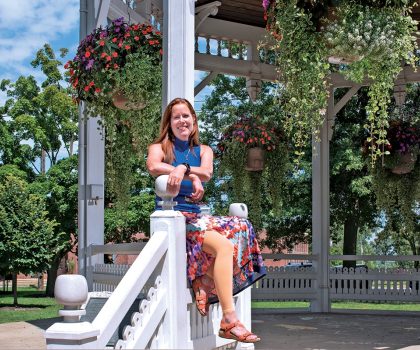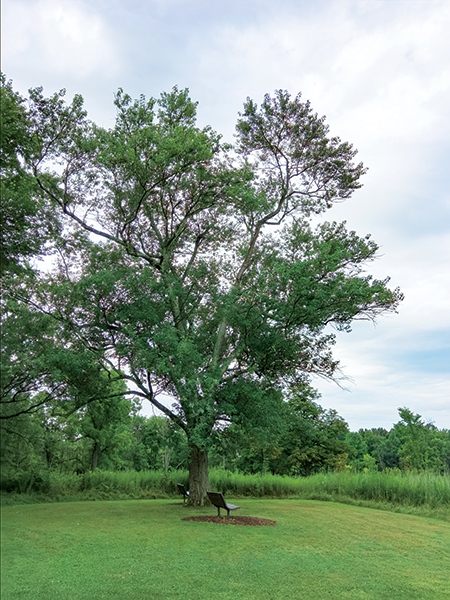Here’s how Mentor’s Center for Advanced Vein Care can help you improve your life—by improving your legs

By Mitch Allen
Each summer, most of us intend to be active, including hiking, walking on the beach, and keeping up with our kids or grandkids at Cedar Point. But by summer’s end, many of us discover that we’ve fallen short of our goals, often due to leg pain and fatigue. We didn’t have the active summer we planned. Instead of walking on the beach, we sat in a chair. Instead of exploring Cedar Point, we sat on a bench.
“Keeping moving is one of the best things you can do for your overall health,” explains local physician Sonja Stiller, M.D. “Using your leg muscles—that is, walking—improves your cardiovascular system and helps you lose weight.”
And that’s not all.
Toxic Build-up
If your feet are tired at the end of the day or if you find yourself having to stop and rest while shopping in the mall, you may be suffering from a circulatory issue, says Dr. Stiller, a double-board-certified physician and founder of Mentor’s Center for Advanced Vein Care. And that can affect your entire quality of life.
“When we stop moving, our muscles begin to waste away and are not as strong,” she explains.
“Weak muscles decrease your venous return, which means your blood has a hard time returning to your heart and tends to pool in your legs. That causes pain and swelling, but that’s not all. It also causes metabolic waste—toxins—to build up in your body.”
Toxins?
“The blood leaving the heart is rich with oxygen and nutrients and delivers them throughout the body,” explains Dr. Stiller.
“But the blood returning to the heart and other organs contains waste collected from our cells. In other words, our body uses our veins to help ‘take out the trash,’ and if our veins aren’t functioning properly, the trash builds up inside of us.”
And nothing takes out the trash like strong calf muscles.
“That’s right,” Dr. Stiller says.
“The calf muscle is like the heart of the legs. In fact, some doctors call the calf muscle ‘the second heart.’ Having weak calves is like having a weaker heart. That’s why it’s so important to keep moving, to stay active. But moving is not as easy as it sounds for people with venous disease. That’s why we’ve dedicated our practice to helping our patients be more active.”
Simple Treatments/Personalized Care
Although Dr. Stiller relies on many advanced medical procedures to eliminate varicose veins and other circulatory issues, she and her team also employ less invasive but often highly effective methods to get you moving.
“We help patients increase calf muscle strength by working with them to do specific exercises that are right for them,” she says. “This may include exercising with bands, moving up and down on your toes, or doing a walking regimen that gradually increases over time. We do everything we can to increase leg muscle strength.”
Other treatments include something as simple as compression stockings, which her team offers in fun and funky colors.
But what makes Center for Advanced Vein Care so different from other vein centers is the personalized care.
“We’re not a part of big group so we’re able to offer highly personalized care,” she says. “Here, you’re not a number. We get to know you one-on-one and you’ll always see me on every visit.”
Serious Health Concern
Nearly 1 in 4 adults suffers with venous disease, including nearly half of all adults over age 50. And while many people still believe that varicose veins are simply a cosmetic concern, they are often a serious health issue resulting in chronic leg pain, fatigue, itching, burning, Restless Leg Syndrome (RLS), leg cramps, swelling, and life-threatening blood clots.
There is a myth that varicose veins are a problem only for the elderly, but that’s not true. While aging does increase your risk, varicose veins often run in families. And being overweight or pregnant—or having a job where you stand for long periods of time—increases pressure on leg veins which can also lead to varicose veins.
Dr. Sonja Stiller uses the branches of a tree as a metaphor to explain varicose veins and the venous system. “If a branch is broken,” she says, “we need to prune it.”

If your vein issue does require more significant treatment than a proper exercise regimen or compression stockings, know that Dr. Stiller is one of the Midwest’s most highly trained physicians in a number of different procedures for treating varicose veins, including endovenous laser ablation (EVLA).
During this procedure, a tiny laser is inserted into the vein through an IV, where an ultrasound helps the doctor locate the proper placement. The laser heats the vein, causing it to close down. A local anesthesia minimizes any discomfort associated with EVLA.
Center for Advanced Vein Care also provides care for cosmetic concerns related to vein disease, including the treatment of spider veins, thread veins, facial and hand veins. And because these procedures take time, you should get started now if you want to see significant difference before next spring.
“Most insurance companies have a minimum six-week compression stocking requirement,” Dr. Stiller says. “So, the entire process takes longer than most people realize.”
Experience Matters
When it comes to venous care, experience is essential. Dr. Stiller is board-certified in both Venous and Lymphatic Medicine (Phlebology) and in Emergency Medicine. She earned her medical degree in 1995 from the Medical College of Pennsylvania, and during her residency she concentrated on trauma, critical care, and pediatric trauma.
After 13 years of serving in emergency departments in Philadelphia and in Northeast Ohio, she elected to specialize in the area of venous and lymphatic medicine.
Her clinic’s specialties include the treatment of Varicose Vein Disease, Chronic Venous Stasis, Venous Ulceration and Post Thrombotic Syndrome, along with their associated symptoms.
“We don’t dabble in this,” Dr. Stiller insists. “We’re 100%-dedicated to veins. And because we’ve been doing it for so long, we’ve handled a lot of different cases. We’ve seen it all.”
Dr. Sonja Stiller is a diplomat of both the American Board of Emergency Medicine and the American Board of Venous and Lymphatic Medicine. She is the founder of the Center for Advanced Vein Care, a Tier 1 provider with Lake Health Hospital System, located at 7200 Mentor Avenue, in Mentor. For an appointment, call 440-710-1140. More information can be found at YourHealthyVeins.com.
